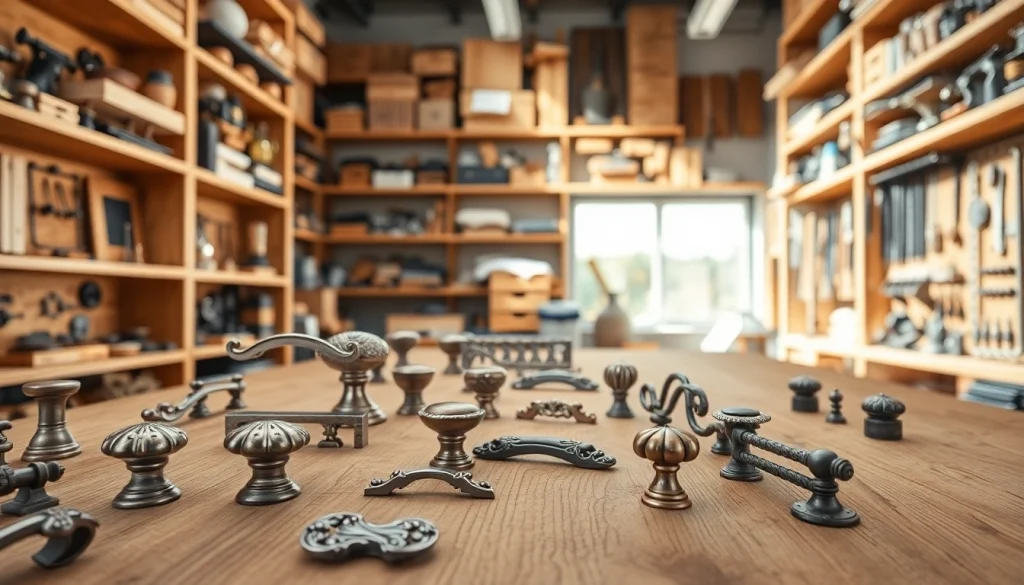Leading Furniture Hardware Suppliers: Quality Products for Every Project

Understanding the Role of Furniture Hardware Suppliers
In the realm of furniture design and manufacturing, the choice of hardware is as critical as the material used in construction. Furniture hardware suppliers provide the essential components that enhance functionality and aesthetic appeal. Whether you are a DIY enthusiast, a professional cabinet maker, or a large furniture manufacturer, understanding the role of these suppliers can significantly impact your project’s success.
What Are Furniture Hardware Suppliers?
Furniture hardware suppliers are companies that manufacture and supply various hardware components essential for furniture assembly and finishing. These components include hinges, drawer slides, knobs, pulls, fasteners, and other specialized items that facilitate the creation of functional and visually appealing furniture. These suppliers often cater to a wide range of customers, from individual consumers and small businesses to large manufacturing companies.
The Importance of Quality in Furniture Hardware
Quality is paramount when it comes to furniture hardware for several reasons:
- Durability: High-quality hardware ensures longevity, preventing failures that could compromise the furniture’s function or safety.
- Aesthetic Appeal: The right hardware enhances the overall look and feel of the furniture, contributing to its design and style.
- Customer Satisfaction: Durable and aesthetically pleasing hardware increases customer satisfaction and can generate repeat business.
Investing in high-quality furniture hardware is not merely a cost—it’s an investment in the value of the final product.
Types of Furniture Hardware Available
Furniture hardware encompasses a broad range of components, each serving a specific purpose:
- Drawer Slides: Critical for smooth opening and closure of drawers, available in various types such as side, under-mount, and center-mount.
- Hinges: Essential for doors and lids, these come in numerous styles, including concealed, decorative, and pivot hinges.
- Knobs and Pulls: Available in numerous designs, materials, and finishes, these hardware pieces add personality to cabinetry.
- Fasteners: From screws to nails, these components play a vital role in securing different furniture parts together.
- Furniture Legs and Bases: Offer stability and style, with options ranging from traditional wooden legs to modern metal bases.
Top Features to Look for in Furniture Hardware
Durability and Material Quality
When selecting furniture hardware, durability is non-negotiable. Hardware should be robust enough to withstand daily use without wear and tear. Additionally, the material quality plays a significant role in the durability of the hardware:
- Metal: Stainless steel, brass, and zinc-alloy are preferred for their strength and resistance to corrosion.
- Plastic: Often used in hinges and fasteners, high-grade plastics can also be durable, but they may not always match the longevity of metal.
- Wood: Used for certain hardware types, it should be treated to resist warping and decay.
Design Aesthetics and Functionality
Beyond durability, hardware must complement the furniture’s design. This entails not only the style but also how these components function. A well-designed pull can enhance the overall visual theme of a piece while ensuring ease of use:
- Coherence: The hardware should align with the furniture’s design language, whether contemporary, traditional, or rustic.
- Functionality: Hardware should not only look good but also operate smoothly; a drawer slide should provide a frictionless action.
Compatibility with Various Furniture Styles
Different furniture styles necessitate different hardware types. For instance, modern furniture often requires sleek, minimalistic hardware, while traditional styles may benefit from ornate designs. Suppliers should offer a range sufficient to match various aesthetic preferences:
- Contemporary Designs: Require sleek, understated hardware.
- Rustic and Vintage: Often call for uniquely finished or antique-styled hardware.
How to Choose the Right Supplier for Your Needs
Evaluating Supplier Credentials and Experience
Selecting the right supplier is as critical as choosing the right hardware. Start by evaluating their credentials and industry experience. Established suppliers typically have a better understanding of market demands and quality standards:
- Industry Reputation: Look for suppliers with a strong track record in the market.
- Certifications: Check for industry certifications that can guarantee product quality.
Customer Service and Support Considerations
Good customer service is vital in ensuring a smooth purchasing process. Evaluate the following:
- Responsive Communication: A quick response to inquiries indicates a supportive supplier.
- Technical Assistance: Access to consultants or technical support can provide value during the selection process.
Comparative Pricing and Value Assessment
While it’s tempting to go for the cheapest option, a comparative pricing approach should be based on the value provided. Low-cost suppliers may skimp on quality:
- Price Levels: Gather multiple quotes from various suppliers for the same products.
- Value for Money: Consider the quality, warranty, and support when determining overall value.
Best Practices for Sourcing Furniture Hardware
Conducting Market Research on Suppliers
Market research is critical in identifying reputable suppliers. It allows you to understand the competitive landscape and the options available. Take advantage of industry reports, trade shows, and online reviews to gather insights.
Understanding Supply Chain Efficiency
Supply chain efficiency affects the lead time and delivery reliability:
- Logistics Capabilities: Assess how well a supplier can manage shipping logistics.
- Inventory Management: A well-managed inventory indicates reliability and availability of products.
Building Long-Term Relationships with Suppliers
Establishing long-term relationships with furniture hardware suppliers can lead to numerous benefits like volume discounts and priority service. Consider the following:
- Consistent Orders: Regular purchasing can incentivize suppliers to offer better rates.
- Feedback Loop: Creating a communication channel can help both parties improve their offerings and services.
Case Studies: Successful Collaborations with Furniture Hardware Suppliers
Innovative Designs Achieved through Suppliers
To illustrate the impact of quality suppliers, consider the case of a small furniture workshop that partnered with a reputable hardware supplier. By using premium drawer slides sourced from a renowned company, they transformed their product line to include smoother-operating drawers that attracted more customers. The partnership allowed them access to specialized hardware that enabled innovative designs that set them apart from competitors.
Feedback and Testimonials from Customers
Customer feedback serves as a vital tool for evaluating supplier effectiveness. One case study highlights how a furniture maker integrated client feedback into their hardware selection. By opting for high-quality cabinet knobs after receiving multiple requests, they not only improved customer satisfaction but also increased their sales by 20% within six months.
Impact on Project Timelines and Quality
Another furniture manufacturer reported that by switching to a more reliable supplier, their project timelines improved significantly. They experienced a 30% reduction in delays due to out-of-stock components, allowing them to complete projects on time while maintaining high quality.







